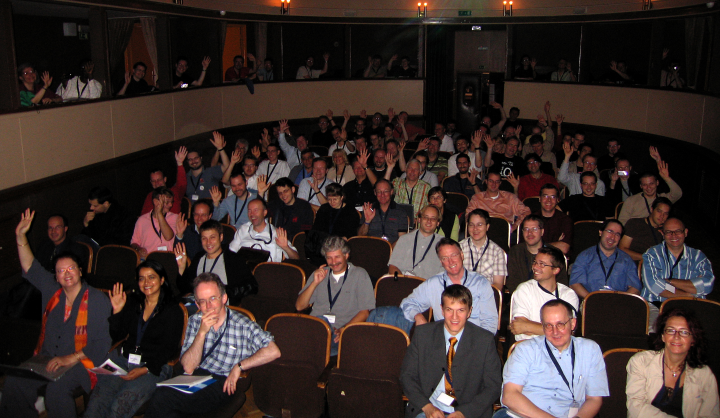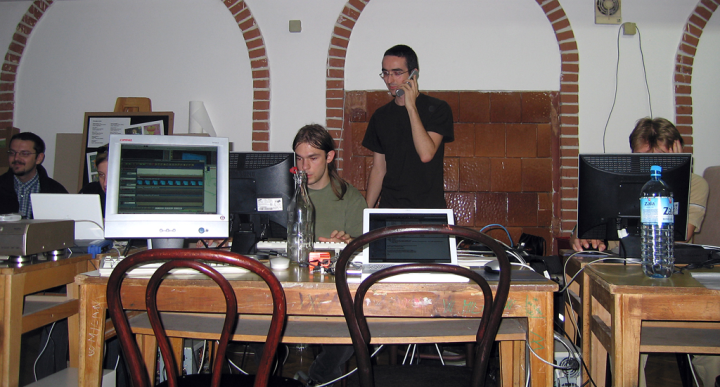
Yeah, at the conference there were speeches and press briefings and so on, but the main thing was all the good stuff there to be learned, some of which is related here. Plus a rare live photo of a slashdotting experience from the inside. [Update: They fixed the video.]
OS X · There are currently two versions of OpenOffice available on Mac; the X11 version, which is up-to-date with the latest and is pretty fast and can read ODF. But it isn’t very Mac-like (as in, no drag-&-drop) and there are all sorts of font issues. Then there’s Neo/J, what I normally use, which is Mac-Like, except for it lags a couple of versions of OO.o, and a couple of versions of Java, behind the mainstream, so doesn’t read ODF at the moment. Also it could be faster.
So the Mac porting team (Eric Bachard presenting) announced that they’ve decided to give up on X Windows (hey, that reminds me of why I switched to the Mac in the first place), bite the bullet, and do the thing right, in Cocoa. It’s gonna be a big tough job, but it’s worth doing.
I wonder if Apple cares and if they might be inclined to help? OO.o isn’t really aimed at the same audience as Pages and Keynote, and it might be kind of nice to have one office suite that can read & write ODF.
Some of the attendees; this neat old theatre was opera-style, with balconies going up and up.
Microsoft · A high-level Microsoft Europe guy showed up, piped up in one of the sessions about how the the Office 12 XML really is open and how these OpenOffice people are anti-American; then Simon Phipps tells me that he got the Redmond message one-on-one.
This during the same 48-hour period where Brian Jones admitted that you probably can’t process the Microsoft formats with GPL-licensed software (that’d be like, what, half the OSS universe? How convenient). And at the same time, we at Sun blew out the FUD about our legal relationship to ODF.
Bad Formula Trouble · I learned, to my dismay, that the ODF specification is silent on spreadsheet formulas, they’re just strings. This is obviously a problem; much discussion on what to do ensued. I lean to the idea, much bally-hooed by Novell, of simply figuring out what Excel does, writing that down, and building it into ODF v.Next. Mind you, anyone who’s really been to the mat with Excel, in terms of Math & Macros, knows that it isn’t a pretty picture, there are real coherency problems. But it’s good enough and the world has learned how to make it work.
And please take note: when work needs doing on an Open Standard, it happens out in the open where anyone who cares can listen and take part (even Microsoft) (especially Microsoft), not in any single vendor’s back room.
The Opposite of Anglo-Centric · OpenOffice.org is on first glance Eurocentric until you realize some of the most exciting work is being done in India and Southeast Asia. It’s just weighted away from the Anglophone world, that’s all; and that’s wonderful.
They were kicking around the question of where next year’s meeting would be, and nobody suggested Santa Clara or Back Bay, dig it.
The Community · By far the biggest take-away was the people not the technology. The conference was full of these young folk from Hungary and Spain and Cambodia and Italy and this time especially Slovenia who are really first-rate hackers and mostly doing this on their own time and out of their own wallet, not because they’re gonna get rich or to beef up their resume but because it’s the Right Thing To Do.
Some of them are ardent members of the FSF church, which I’m not, but you just gotta love them. Mind you, it means I get lots of earnest lectures about Open-Sourcing Java, but you gotta be able to deal with that if you wanna wear this hat.
And in between the technology, they fed us good food and showed us a good time and staged everything beautifully. I’m in awe; the world owes these people a thank-you.
Coda: Inside a Slashdotting · A few people from CyberPipe had constituted themselves “The Media Team” and covered the conference lavishly, posting video and transcripts and publishing a daily conference newsletter (all Free Software technology, natch). They had an appealingly-grubby work-room festooned with wires and servers and power supplies and so on.
Early on Friday, I did an interview with the Media Group’s Jure Cuhalev (on the porch of a lovely café in Tito Square) and when we were done, talking of this and that, he griped that he’d submitted a half-dozen stories on the conference to Slashdot and they’d all been bounced.
Anyhow, later that morning I was camped on a sofa in the Media Group room
to leech some laptop power and happened to hit Slashdot and what do you know,
they’d picked up Jure’s post on my keynote (BTW guys, I’m pissed that you cut
it two-thirds of the way through, the left-out part was the most interesting,
I thought) [Update: They fixed it! Thanks].
So I had the immense pleasure of lifting my head and saying “Guys, you’re on Slashdot” and their faces were like kids in front of the tree on Christmas morning. Then they realized that they had a site hanging out there with all these 100-meg-plus Ogg clips, and the Eastern Time zone due to wake up in a couple of hours, and started to get tense.
But I hear that they got some mirroring help from Arnes and Ljudmila and the site held up pretty well. Good on ya, guys.
October 01, 2005
· Technology (90 fragments)
· · Mac OS X (119 more)
· · Open Source (82 more)
· · XML (136 more)
· Technology (90 fragments)
· · Mac OS X (119 more)
· · Open Source (82 more)
· · XML (136 more)

